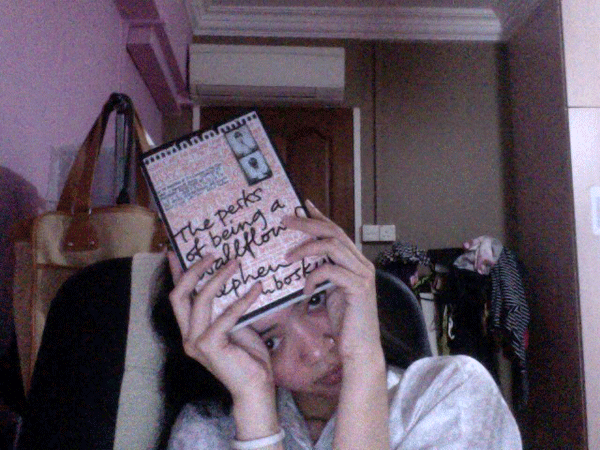and i like it very much

the perks of being a wallflower by stephen chbosky
i like it firstly because of the language, distinctly simple but not in catcher in the rye distinctly rebellious kind of way, or exaggeratedly studded with run-on sentences in the curious accident of the dog at the night time kind of way. it is really not trying to be poetic, or insurgent, or aloof, or romantic. it doesn't try to be anything, and that is exactly why i think it is great. of course the previous two books have been of a tremendous enjoyment to me as well and i cannot point my finger at them for their entertaining hyperbole considering the contexts the characters are surrounded by (e.g asperger syndrome in curious incident); but i guess perks just reinvents the whole high school mess drama. i felt like it was really an extremely honest account, moderate but never in the slight manner boring, just well-conveyed. when a high school tales like this surface i usually turn skeptical at their offering other than to reveal the dark side of teenage years some people might long to reminisce (and hence, making them instant hit) but perks definitely offers more than that.
re: language, i think this thought somehow intersects with my boyfriend's and i showed it to him and he nodded and resumed his reading:
First of all, Bill gave me a C on my To Kill a Mockingbird essay because he said that I run my sentences together. I am trying now to practice not to do that. He also said that I should use the vocabulary words that I learn in class like "corpulent" and "jaundice." I would use them here, but I really don't think they are appropriate in this format.re: perspective regarding extremities, my politics lecturer once mentioned that tv is trying to portray the extremes very much because they qualify as news. it is of course an inaccurate image of the reality because of the rule of large number: certain kinds of distribution, at any point of time, at any place, always resemble a normal curve. for example, the curve of 'number of rebellious acts done by high schooler'. a lot of people have it in the middle but the media are trying to show the shocking figures that come from a handful of extreme cases. the perks tells a story of those in the middle. i think it is necessary to have things like this for a while because no matter how great works based on extreme cases are it is good to draw close proximity with the truth. it keeps you sane and it prevents your perspectives from getting too skewed.
To tell you the truth, I don't know where they are appropriate to use. I'm not saying that you shouldn't know them. You should absolutely. But I just have never heard anyone use the words "corpulent" and "jaundice" ever in my life. That includes teachers. So, what's the point of using words nobody else knows or can say comfortably? I just don't understand that.
i finished part 2-4 today and if it's not not boring i don't know what is not
the book consists of a series of letters dedicated to an anonymous friend, and in those the protagonist pours out all his emotions, his fits, and his accounts of the days. and certainly not in the bad way. like when he passes out he simply says that he passes out. this felt like a luxury to me because had it been written in third person i believe the event of his passing out would have been exaggerated to illustrate the serious extent of it and i would have dreaded my way through the long-winded depiction. i mean i like vivid descriptions but his letters are just refreshing. his belittling his suffering only does a reversed effect on me--it makes me think he's got something greater than mere emotional problems he barely mentions.
our protagonist charlie (i don't think that is his real name, neither do i think other characters' are, referring to charlie's first letter) is a brilliant kid, initially awkward during social circumstances (even in school); but makes his way to meet new friends. he likes to read and i like most of the books he reads too. he likes making mixtapes which i also like to do.
a lot of things he says make sense to me and here is one of my favorite quotes off the book
I think that if I ever have kids, and they are upset, I won’t tell them that people are starving in China or anything like that because it wouldn’t change the fact that they were upset. And even if somebody else has it much worse, that doesn’t really change the fact that you have what you have. Good and bad. Maybe it’s good to put things in perspective, but sometimes, I think that the only perspective is to really be there. Like Sam said. Because it’s okay to feel things. And be who you are about them.i might be still telling them about china and africa but the point is it is okay to not feel okay sometimes, which should not be interpreted as a license to dwell on the bad days but just to let them pass readily

No comments:
Post a Comment